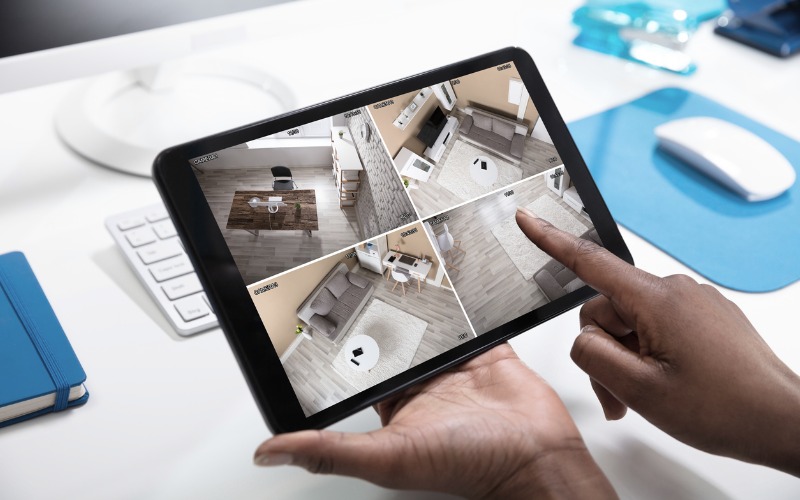Is Self-Monitored Security Enough? Self-monitored security can be effective when combined with robust features like real-time alerts, remote access, and comprehensive camera coverage, but professional monitoring offers additional reassurance and immediate response in emergencies.
The Pros and Cons of DIY Security Systems: Can You Trust Yourself?
In recent years, there has been a significant rise in the popularity of do-it-yourself (DIY) security systems for homes. With advancements in technology and the increasing affordability of security equipment, more and more homeowners are opting to install their own security systems rather than relying on professional installation.
Home security is of utmost importance, as it helps protect our loved ones and our valuable possessions. In this article, we will explore the rise of DIY security systems, the pros and cons of these systems, and whether they are a reliable and effective option for home security.
DIY Security Systems: The New Trend in Home Security
DIY security systems are self-installed and self-monitored security systems that homeowners can set up themselves without the need for professional assistance. These systems typically include components such as cameras, sensors, alarms, and control panels that can be easily installed and connected to a central hub or smartphone app.
The rise of DIY security systems can be attributed to several factors. Firstly, advancements in technology have made it easier for homeowners to access affordable and user-friendly security equipment. Additionally, the increasing availability of online tutorials and resources has empowered homeowners to take matters into their own hands when it comes to home security.
Pros of DIY Security Systems: Cost and Convenience
One of the main advantages of DIY security systems is the cost savings compared to professional systems. Traditional professional installation can be expensive, with homeowners often having to pay for equipment, installation fees, and monthly monitoring fees. DIY systems eliminate the need for professional installation, allowing homeowners to save money on installation costs. Additionally, many DIY security systems offer flexible pricing options, allowing homeowners to choose the components they need and customize their system according to their budget.
Another benefit of DIY security systems is the convenience of installation and customization. With DIY systems, homeowners have the freedom to install their security equipment at their own pace and according to their specific needs. They can choose the best locations for cameras and sensors, and easily adjust and expand their system as needed. DIY systems also offer the convenience of remote access, allowing homeowners to monitor their home from anywhere using their smartphone or computer.
Cons of DIY Security Systems: Lack of Professional Expertise
While DIY security systems offer cost savings and convenience, one of the main drawbacks is the lack of professional expertise. Professional security companies have years of experience and knowledge in designing and installing security systems, ensuring that all components are properly installed and integrated. DIY installation may not always be as thorough or effective, potentially leaving vulnerabilities in the system. Additionally, homeowners may lack the knowledge and experience to properly maintain and troubleshoot their DIY systems, which could lead to issues with functionality or false alarms.
Another potential downside of DIY security systems is the potential for mistakes in installation and maintenance. Without professional guidance, homeowners may make errors during installation that could compromise the effectiveness of their system. For example, improper placement of cameras or sensors could result in blind spots or false alarms. Additionally, without regular maintenance and updates, DIY systems may become outdated or less reliable over time.
DIY Security Systems vs. Professional Security Systems: Which is Better?
When deciding between a DIY security system and a professional security system, there are several factors to consider. Firstly, budget plays a significant role. DIY systems are generally more affordable upfront, as they eliminate the need for professional installation fees. However, it’s important to consider long-term costs such as monitoring fees and maintenance expenses.
Another factor to consider is the level of expertise required. DIY systems are designed to be user-friendly and accessible to homeowners with little to no technical knowledge. However, if you are not confident in your ability to install and maintain a security system on your own, it may be worth investing in a professional system that comes with expert installation and ongoing support.
Additionally, consider the level of customization and control you desire. DIY systems offer the flexibility to customize your security setup according to your specific needs and preferences. On the other hand, professional systems may offer more advanced features and integration options that are not available with DIY systems.
The Importance of Monitoring with DIY Security Systems
Monitoring is a crucial aspect of any security system, as it ensures that any potential threats or incidents are promptly detected and responded to. While some DIY security systems offer self-monitoring options, where homeowners receive alerts and notifications directly on their smartphones, others may offer professional monitoring services for an additional fee. Professional monitoring involves a team of trained professionals who monitor your security system 24/7 and can dispatch emergency services if necessary.
Having professional monitoring can greatly enhance the effectiveness of DIY security systems. It provides an extra layer of protection and peace of mind, as homeowners can rest assured that their home is being monitored even when they are not available to do so themselves. Additionally, professional monitoring can help reduce false alarms, as trained professionals can quickly assess the situation and determine whether it requires further action.
DIY Security Systems: Are They Reliable?
Reliability is a common concern when it comes to DIY security systems. Homeowners may worry that self-installed systems may not be as reliable as professionally installed ones. However, with proper installation and maintenance, DIY security systems can be just as reliable as professional systems.
To ensure the reliability of a DIY system, it’s important to carefully follow the manufacturer’s instructions during installation. This includes properly mounting cameras and sensors, ensuring they are securely attached and positioned correctly. Regular maintenance is also crucial to ensure that all components are functioning properly and that any issues are promptly addressed.
Additionally, choosing high-quality equipment from reputable manufacturers can also contribute to the reliability of a DIY system. Research different brands and read customer reviews to ensure you are investing in reliable and durable equipment.
The Risk of False Alarms with DIY Security Systems
False alarms can be a nuisance and can potentially lead to fines or penalties from local authorities. DIY security systems may be more prone to false alarms if not properly installed or maintained. For example, if a motion sensor is placed in an area with frequent movement, such as near a busy street, it may trigger false alarms. Similarly, if cameras are not properly adjusted, they may capture irrelevant movement and trigger false alarms.
To minimize the risk of false alarms with DIY systems, it’s important to carefully consider the placement of sensors and cameras. Avoid placing sensors in areas with high traffic or where pets may trigger them. Regularly test your system to ensure that all components are functioning properly and adjust settings as needed to reduce false alarms.
The Role of Technology in DIY Security Systems
Technology plays a crucial role in DIY security systems, enabling homeowners to easily install, monitor, and control their systems. Many DIY systems utilize wireless technology, allowing for easy installation without the need for extensive wiring. Wireless cameras and sensors can be easily mounted and connected to a central hub or smartphone app.
Additionally, advancements in technology have led to the development of smart home integration features in DIY security systems. Homeowners can now integrate their security systems with other smart home devices such as door locks, lights, and thermostats, allowing for seamless automation and control.
Technology also enables remote access and monitoring of DIY security systems. Homeowners can receive real-time alerts and notifications on their smartphones when their system detects any suspicious activity. They can also remotely view live video feeds from their cameras and control their system settings from anywhere.
The Potential for DIY Security Systems to be Hacked
With the increasing reliance on technology in DIY security systems, there is a potential risk of these systems being hacked. Hackers may attempt to gain unauthorized access to a system’s cameras or control panel, potentially compromising the security of a home.
To protect DIY security systems from hacking, it’s important to follow best practices for cybersecurity. This includes regularly updating firmware and software to ensure that any vulnerabilities are patched. Additionally, homeowners should use strong and unique passwords for their system and Wi-Fi network, and enable two-factor authentication whenever possible. It’s also advisable to regularly monitor and review system logs for any suspicious activity.
DIY Security Systems: The Future of Home Security?
The rise of DIY security systems suggests that they may be the future of home security. With advancements in technology and the increasing affordability of security equipment, more homeowners are opting for DIY systems over traditional professional installation. DIY systems offer cost savings, convenience, and customization options that appeal to many homeowners.
In the future, we can expect to see further advancements in technology that will enhance the capabilities of DIY security systems. This may include improved integration with other smart home devices, enhanced video analytics, and more advanced monitoring options. Additionally, as more homeowners embrace DIY security systems, we may see an increase in online communities and resources dedicated to sharing tips and best practices for installation and maintenance.
Making the Decision: DIY Security Systems or Professional Security Systems?
When making a decision between a DIY security system and a professional security system, it’s important to consider your specific needs, budget, and level of expertise. If you are comfortable with technology and have the time and patience to install and maintain a system on your own, a DIY system may be a cost-effective option. However, if you prefer professional guidance and ongoing support, or if you have specific security requirements that may require more advanced features or integration options, a professional system may be the better choice.
Ultimately, the decision should be based on your individual circumstances and priorities. Consider consulting with security professionals or conducting thorough research to determine which option is best suited to your needs.
DIY security systems have become a popular choice for homeowners looking to enhance the security of their homes. These systems offer cost savings, convenience, and customization options that appeal to many homeowners. While there are potential drawbacks such as lack of professional expertise and the risk of false alarms, with proper installation, maintenance, and monitoring, DIY security systems can be reliable and effective.
When deciding between a DIY system and a professional system, it’s important to consider factors such as budget, level of expertise, and desired level of customization. Additionally, it’s crucial to prioritize monitoring and take steps to protect DIY systems from hacking.
In conclusion, DIY security systems have the potential to be the future of home security. With advancements in technology and increasing accessibility, more homeowners are empowered to take control of their home security. However, it’s important to carefully consider your specific needs and circumstances when making a decision between a DIY system and a professional system.



